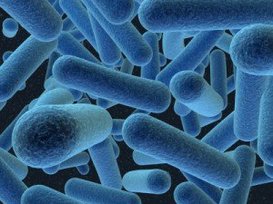
Bacillus subtilis is currently used for oral bacteriotherapy and bacterioprophylaxis of gastrointestinal disorders (mostly as a direct result of antibiotic treatment), many of which lead to diarrhea, as an oral probiotic. Commercial B. subtilis probiotic preparations include Enterogermina and Biosubtyl.
Ingestion of significant quantities of B. subtilis is thought to restore the normal microbial flora following extensive antibiotic use or illness (see this 1994 review). Probiotic preparations of B. subtilis are sold commercially in most European countries, although little is understood about how these bacteria exert their therapeutic benefit. B. subtilis is a gram-positive, nonpathogenic, spore-forming organism normally found in the soil, and the robustness of spores is thought to enable passage across the gastric barrier, where a proportion of spores germinate in the small intestine and populate, albeit briefly, the intestinal tract
A 1999 study found that two commercial preparations of probiotic bacteria purported to contain B. subtilis contain instead Bacillus species that are closely (Biosubtyl) and distantly (Enterogermina) related toB. subtilis. This finding is medically important and raises the question of whether any nonpathogenic, gram-positive microorganism can serve as a probiotic agent.
